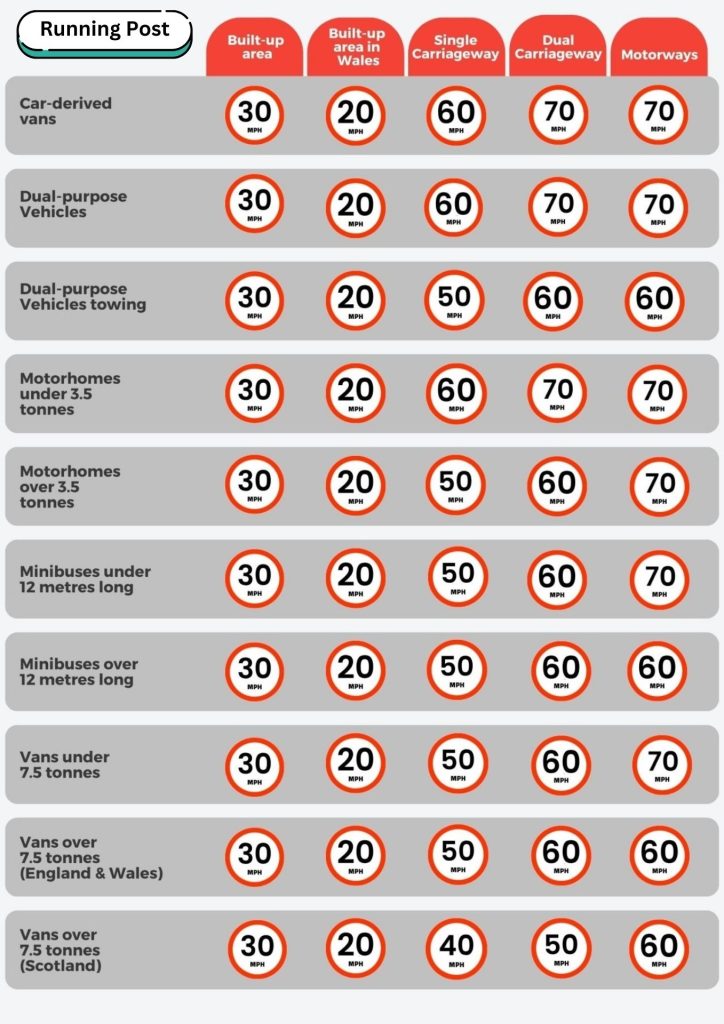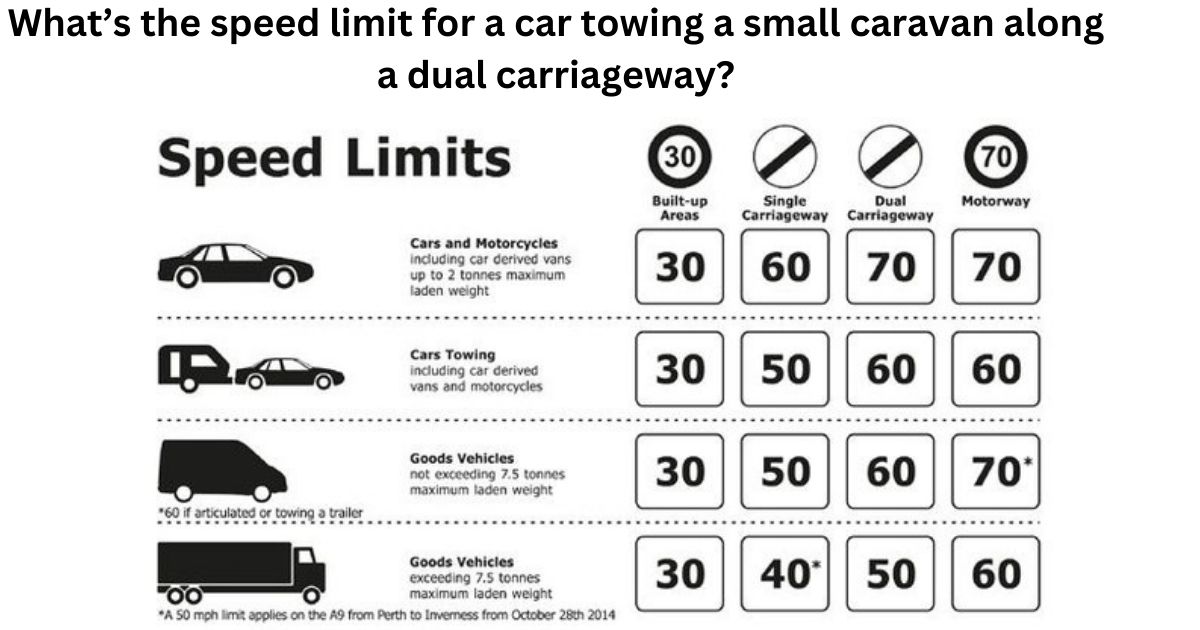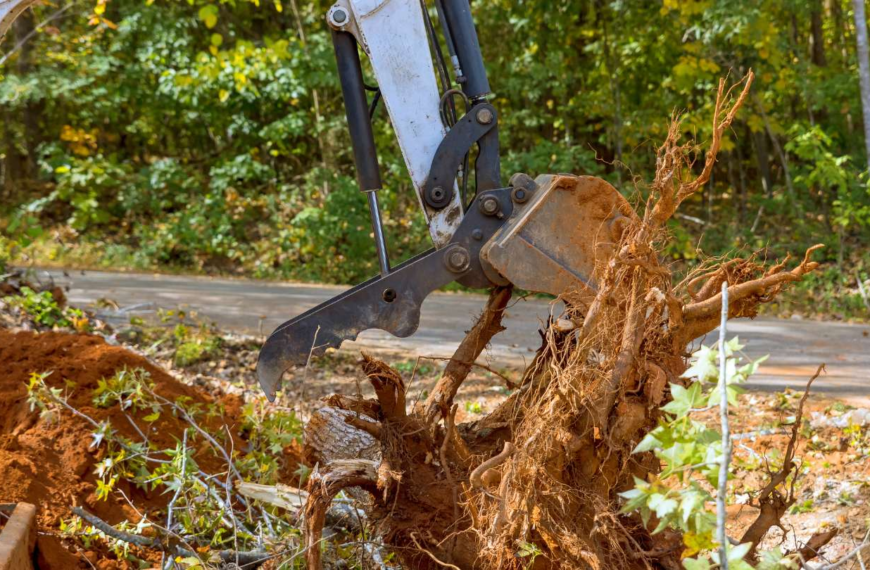| A: 50 mph | B: 60 mph | C: 70 mph | D: 40mph |
Understanding Speed Limits for Towing a Caravan
Introduction
When you’re towing a small caravan, understanding and adhering to speed limits is crucial for safety and compliance. Speed regulations vary depending on the type of road and the country you are driving in. Knowing these limits helps avoid penalties and ensures a smoother, safer journey. This article will break down the speed limits for towing a caravan on a dual carriageway and other relevant road types in both the UK and Ireland, highlighting key differences and practical considerations.
Importance of Knowing Speed Limits
Speed limits are designed to ensure safety on the roads. For those towing a caravan, adhering to these limits is even more critical due to the additional weight and length of the vehicle combination. Excessive speed can affect the handling and stability of the towing vehicle, increasing the risk of accidents. By understanding the speed limits, drivers can better manage their speed, avoid fines, and contribute to safer road conditions for everyone.
Overview of Speed Regulations for Towing
Speed regulations for towing caravans are generally stricter than for vehicles alone. These regulations are put in place to account for the increased stopping distance and altered vehicle dynamics when towing. It is essential for drivers to be aware of these regulations and adjust their driving accordingly. The following sections will detail the specific speed limits for dual carriageways, as well as variations in the UK and Ireland.
What’s the Speed Limit for a Car Towing a Small Caravan Along a Dual Carriageway?
General Speed Limit for Towing
In the UK, the standard speed limit for a car towing a small caravan on a dual carriageway is 60 mph. This limit is designed to balance safety and efficiency, considering the increased weight and drag caused by the caravan. Exceeding this limit can compromise vehicle stability and increase the risk of accidents, so it’s important to adhere to these regulations.
Specific Limits for Dual Carriageways
Dual carriageways are designed to handle higher traffic volumes and speeds, but they still have speed restrictions for towing. While the general limit for towing a caravan on a dual carriageway is 60 mph, it’s essential to follow any additional road signs or temporary restrictions that might be in place. These signs can indicate reduced speed limits due to road conditions, construction, or other factors.
Speed Limits for Caravans in the UK

Standard Speed Limits for Caravans
In the UK, the standard speed limit for towing a caravan on motorways is 60 mph, and on dual carriageways, it is also 60 mph. For single carriageways, the limit is reduced to 50 mph. These limits ensure that caravans are towed at a speed that maintains safety while allowing for efficient travel.
Variations Based on Road Type
The speed limits for towing caravans can vary depending on the type of road. On single carriageways, the limit drops to 50 mph, while on motorways and dual carriageways, it remains at 60 mph. This differentiation accounts for the varying levels of traffic and road conditions, helping to manage safety more effectively.
Speed Limits for Dual Carriageways
Definition of Dual Carriageways
A dual carriageway is a type of road with two lanes in each direction, separated by a central reservation or barrier. This design allows for higher speeds and smoother traffic flow compared to single carriageways. However, despite the higher capacity and speed potential, speed limits still apply to ensure safety for all road users.
Typical Speed Limits
On dual carriageways in the UK, the standard speed limit is 70 mph for cars. However, for vehicles towing caravans, the limit is reduced to 60 mph. This reduction acknowledges the increased stopping distance and the potential for instability when towing, ensuring that all road users can travel safely.
Speed Limits for Towing a Caravan in Ireland
General Speed Limits for Towing in Ireland
In Ireland, the speed limit for towing a caravan is generally 80 km/h (50 mph) on motorways and dual carriageways. This limit is set to ensure that towing combinations are managed safely, considering the additional weight and potential impact on vehicle dynamics.
Differences Compared to the UK
While the speed limits for towing caravans in Ireland are similar to those in the UK, there are differences in the numerical values due to the use of different measurement systems. In the UK, the speed limit is 60 mph on dual carriageways, whereas in Ireland, it’s 80 km/h. Drivers should be aware of these differences when traveling between countries.
You Also Like It:
What should you do before driving into a tunnel?
What Should you do Immediately After Joining a Motorway?
How much more fuel will you use by driving at 70 mph, compared with driving at 50 mph?
Practical Considerations
Adjusting Speed for Safety
Even when adhering to speed limits, it’s important to adjust your speed based on road conditions, weather, and traffic. Towing a caravan requires more stopping distance and can be affected by wind and other factors. Drivers should be prepared to slow down in adverse conditions or heavy traffic to maintain safety.
Compliance and Penalties
Failing to adhere to speed limits can result in fines and penalties. In addition to legal repercussions, driving too fast while towing a caravan can compromise safety, leading to accidents or damage. Ensuring compliance with speed regulations is not only a legal requirement but a critical aspect of safe driving practices.
Conclusion
Summary of Key Points
In summary, the speed limit for towing a small caravan along a dual carriageway is 60 mph in the UK and 80 km/h (50 mph) in Ireland. These limits are designed to ensure safety and efficiency on the road. Understanding and adhering to these regulations is essential for safe towing.
Importance of Adhering to Speed Limits
Adhering to speed limits is crucial for maintaining road safety, especially when towing a caravan. By following the prescribed limits, drivers can reduce the risk of accidents, avoid penalties, and ensure a smoother journey for themselves and others on the road.
FAQs About What’s the speed limit for a car towing a small caravan along a dual carriageway
What is the speed limit for a car towing a small caravan on a dual carriageway in the UK?
The speed limit for a car towing a small caravan on a dual carriageway in the UK is 60 mph. This limit is in place to ensure safety, considering the additional weight and impact on vehicle handling when towing.
Are there different speed limits for caravans on different types of roads in the UK?
Yes, in the UK, speed limits for caravans vary by road type. On motorways and dual carriageways, the speed limit is 60 mph. On single carriageways, it is reduced to 50 mph. These variations help manage safety based on road conditions and traffic flow.
What is the speed limit for a caravan on a dual carriageway in Ireland?
In Ireland, the speed limit for a caravan on a dual carriageway is 80 km/h, which is equivalent to 50 mph. This limit helps ensure that towing combinations are managed safely on these types of roads.
How does the speed limit for towing a caravan in Ireland compare to the UK?
In Ireland, the speed limit for towing a caravan is 80 km/h (50 mph) on dual carriageways, while in the UK, it is 60 mph. Drivers should be aware of these differences when traveling between the two countries to ensure they comply with local regulations.
Why are there different speed limits for towing caravans compared to regular vehicles?
The speed limits for towing caravans are lower because the added weight and length of the caravan affect vehicle handling and stopping distance. Lower speed limits help maintain stability and reduce the risk of accidents when towing.
What should I do if road conditions require me to drive slower than the posted speed limit?
If road conditions, such as weather or heavy traffic, require you to drive slower than the posted speed limit, you should adjust your speed accordingly. Prioritizing safety is crucial, even if it means driving below the legal speed limit.
What are the consequences of not adhering to speed limits while towing a caravan?
Failing to adhere to speed limits while towing a caravan can result in fines, penalties, and increased risk of accidents. It’s important to follow speed regulations to ensure safety and avoid legal issues.
You Also like It:
Why is coasting a bad driving technique?
What can cause excessive or uneven tyre wear?
How should you use anti-lock brakes when you need to stop in an emergency?
Releated Posts
MAB Instructor Certification: Your Gateway to Professional Crisis Management Leadership
In today’s fast-evolving professional environments—especially in healthcare, mental health, education, and corrections—conflict and aggression can arise without warning.…
Freewayget.com: Your Ultimate Platform for Deals, Discounts, and Digital Products
Introduction to Freewayget.com In today’s fast-paced digital world, finding reliable platforms that offer authentic discounts, deals, and digital…
Affordable & Fast Embroidery Digitizing Services in Your Area
Embroidery digitizing services provide corporations, designers, and people with brilliant embroidery-equipped designs by means of changing art work…
Introduction to hdhub4u nit
In this article, we will delve into the details of hdhub4u nit, exploring its features, benefits, and why…

















